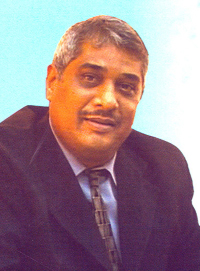A number of measures to bring about vast improvements in the payment of taxes by various categories of taxpayers, including the self-employed, has brought an increase in the level of compliance, Commissioner-General of the Guyana Revenue Authority (GRA), Khurshid Sattaur has said.
The Commissioner-General made this disclosure while expressing his displeasure at the comments made by Treasurer of the Private Sector Commission and the Georgetown Chamber of Commerce, Chandradat Chintamani, according to an article published in the January 13 edition of the Stabroek News.

The GRA in a press release yesterday noted that the article captioned, ‘Revenue Authority must widen its tax collection net’ quoted Chintamani as saying that he estimates the “taxes that are yet to be mopped up by the GRA to be in the region of three to four billion dollars” and further suggested that this is attributable to the level of activity that is going on in the gold industry, among others.
Chintamani, the release added, made particular reference to the self-employed and appeared to suggest that the GRA’s machinery is inadequate and cannot undertake any significant expansion of the its tax collection system.
“I am amazed at the level of misinformation that is being peddled by Mr Chintamani who, because of the senior positions he has held in the private sector for a number of years, quite apart from being a chartered accountant, should be aware that such utterances should be supported by statistical data and other supporting facts. Both of these were lacking in the article,” Sattaur is quoted as saying in the GRA release.
Meanwhile, regarding the issue of taxes collected from the mining industry, the GRA stated categorically that gold miners who are self-employed are subject to a tax of two per cent on their gross takings, and this tax is collected by the Guyana Gold Board on behalf of the GRA.
The Revenue Authority said further that the writer of the article should have sought comments or clarification from the GRA before publishing the said article. Moreover, it added, the senior management of the GRA was concerned that a key player within the private sector would make such statements.
Chintamani ought to know that in recent years a significant amount of infrastructure, funded by external stakeholders, aided the strengthening of the GRA, the release stated.
It pointed out further that the Fiscal and Financial Management Programme (FFMP), Threshold Country Plan/Implementation Project (GTCP/IP) and the National Competitiveness Strategy (NCS) have all greatly enhanced the GRA’s capability to manage tax transformation, establish data security and integrity and also significantly strengthened the agency’s capacity.
The change of the agency’s structure from one that was tax based to one operating along functional lines has tremendously improved the agency’s efficiency, the GRA maintained.
The collective impact of these measures has not only seen vast improvements in the payment of taxes by various categories of taxpayers, including the self-employed, but also led to an increase in the level of increase in compliance.
The release also cited a schedule of registered taxpayers, by tax type, from 2008 to 2011 as evidence of this.
This progression in registration, from 95,363 in 2008, 132,041 in 2009 and 179,435 in 2010, to 212,582 in 2011, has by extension led to an increase in tax compliance which no doubt is due largely to GRA’s continuous taxpayer education campaign, the release stated.
In the meantime, Sattaur also suggested that Chintamani’s interest in the revenue collection of the state may be best served if he uses his familiarity with his colleagues within the private sector to “demand that the membership becomes more tax compliant and perform their duty to the nation as taxpayers with a greater degree of decency; thus, preventing the current massive evasion of taxes,” the release concluded.




